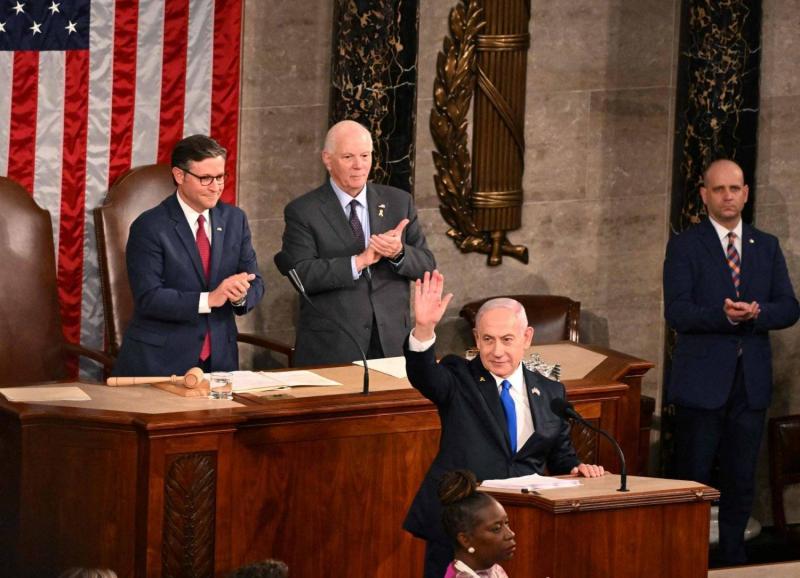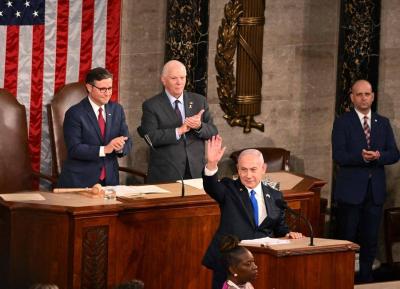The highest honor any foreign leader can receive in America is an invitation to deliver a speech before Congress, both the Senate and the House of Representatives. This is what Israeli Prime Minister Benjamin Netanyahu experienced in Washington on July 25, 2024. In fact, this was the fourth time Netanyahu has been granted this opportunity, making him the most frequently hosted foreign leader in Congress's history. As the United States stood in solidarity with Israel following Hamas's attack on October 7, leading American politicians lined up to greet Netanyahu, interrupting him with standing ovations several times. The key point he emphasized in his speech was that America’s enemies are Israel’s enemies, viewing the battle as one and arguing that American support for Israel equates to supporting America itself.
However, not all the atmosphere was friendly and welcoming for the Israeli Prime Minister, who is leading his country's war in Gaza. The war began after Hamas's attack, which resulted in the deaths of 1,200 Israelis and the capture of dozens as hostages, but since then, the war has killed tens of thousands of Palestinians and displaced hundreds of thousands. Before Netanyahu began his speech, and even before he arrived at the Capitol, massive pro-Palestinian protests extended into the neighboring streets, with thousands gathering, raising Palestinian flags, and chanting slogans condemning Israel and U.S. policy that supports it. They accused Netanyahu of being a war criminal, while he accused them in his speech of being funded by Iran and serving its agenda and that of Hamas.
Netanyahu's visit came in extraordinary circumstances facing America on two significant levels: first, increasing political division in the U.S., and second, noticeable changes in the shift of the American left, which opposes traditional American policy supporting Israel, and its impact somewhat on President Biden's Democratic Party. Netanyahu found himself dealing with these new circumstances in America, and the American political spectrum was not united in welcoming Israel's Prime Minister during wartime, despite support for Israel being one of the most prominent and important constants in American policy, whether the administration is Democratic or Republican.
However, the scene in Congress, which appeared impressive in its celebration of Netanyahu and the unity of the Republican Party in supporting Israel and welcoming its Prime Minister, also showed the absence of a number of Democratic members opposing Netanyahu’s policies. Notably absent was former House Speaker Nancy Pelosi, who issued a statement condemning Netanyahu’s policies. Vice President Kamala Harris was also absent, typically attending large sessions where presidents speak, but she chose not to attend due to her participation in an election rally for her presidential campaign. However, Harris did meet Netanyahu in a separate important meeting, which was distinct from Netanyahu's meeting with Biden; he visited the White House, and Biden received him there in a traditional manner that avoided showing differences in viewpoints, after which they met with representatives of the families of hostages held in Gaza.
The hostage situation has been a point of divergence between American and Israeli priorities from the beginning; Biden has always tried to prioritize the safety and return of hostages in military and political actions, whereas Netanyahu has always considered that the primary and ultimate goal is to destroy Hamas and eliminate its threat to Israel. Biden and Netanyahu made a joint promise to the families to work on the return of the hostages soon. However, fulfilling this promise will depend primarily on concessions that Netanyahu has refrained from offering to Hamas, and he will now face increased pressure from Biden not to halt the course towards an agreement described as a ceasefire in exchange for the release of the hostages, an agreement that Biden and America have failed to mediate for months.
The significance of the Biden-Harris meeting lies in it being practically the most significant occasion for Harris discussing foreign policy since she became the frontrunner for her party’s presidential nomination; while Biden only spoke to the media with traditional welcoming words for Netanyahu during his meeting, Harris spoke following the meeting, standing alongside the Israeli Prime Minister and making it clear, if not definitive, that the time has come for a ceasefire agreement.
Harris did not abandon the fundamental American principle supporting Israel; she affirmed her commitment to supporting Israel’s right to defend itself and strongly condemned Hamas’s attack on Israel. However, Netanyahu's task with her may be more challenging than with Biden if she becomes President; because in direct political terms, she needs to offer more stringent initiatives with Israel to appease the left wing of her party, and she may also need to make promises to American voters of Arab and Muslim descent in order not to lose their votes.
The atmosphere was different when Netanyahu met with Trump; it initially appeared that the disagreement between the two, which began due to Trump’s anger over Netanyahu's acknowledgment of Biden's election victory over him, had ended. Trump welcomed Netanyahu and his wife Sara at his residence in Mar-a-Lago, Florida. Netanyahu found himself at the heart of the electoral battle when Trump harshly criticized Harris, accusing her of disrespecting Israel. Netanyahu avoided making any public promises regarding a near resolution for the hostages, despite coming under sustained pressure from Biden and Harris. Trump, however, expressed his probabilities in his characteristic manner: "If I win the elections, I will support Israel and reach an agreement with Iran that pleases everyone, but if Harris wins, the Middle East is headed for a large war that could be World War III!"
Overall, Netanyahu succeeded in showcasing what he reiterated in his speech before Congress: that the relationship between his country and America is strong, solid, and ongoing, regardless of circumstances and differences in viewpoints. However, he also did not change the beliefs of his critics, which seem to have increased and grown in America. It appears that a significant part of the Democratic Party will continue to criticize him and pressure him, even supporting the idea of his removal from office. Netanyahu hopes this is not a goal for a new administration led by Harris, knowing that this will not be the case if Trump wins.




